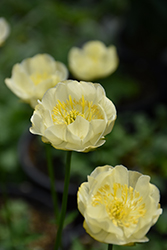Plant Height: 18 inches
Flower Height: 24 inches
Spacing: 14 inches
Sunlight:
![]()
![]()
Hardiness Zone: 3a
Description:
A very popular perennial that bursts into bloom in late spring or early summer with pretty butter yellow blooms; likes even moisture, consider adding a summer mulch around the base; cut back after blooming to encourage a flush of new leaves for summer
Ornamental Features
New Moon Globeflower has masses of beautiful semi-double buttery yellow buttercup flowers with gold eyes at the ends of the stems from late spring to early summer, which are most effective when planted in groupings. The flowers are excellent for cutting. Its deeply cut lobed leaves remain dark green in colour throughout the season.
Landscape Attributes
New Moon Globeflower is an herbaceous perennial with an upright spreading habit of growth. Its relatively fine texture sets it apart from other garden plants with less refined foliage.
This is a relatively low maintenance plant, and should be cut back in late fall in preparation for winter. Deer don't particularly care for this plant and will usually leave it alone in favor of tastier treats. It has no significant negative characteristics.
New Moon Globeflower is recommended for the following landscape applications;
- Mass Planting
- Rock/Alpine Gardens
- Border Edging
- General Garden Use
Planting & Growing
New Moon Globeflower will grow to be about 18 inches tall at maturity extending to 24 inches tall with the flowers, with a spread of 18 inches. When grown in masses or used as a bedding plant, individual plants should be spaced approximately 14 inches apart. It grows at a medium rate, and under ideal conditions can be expected to live for approximately 10 years. As an herbaceous perennial, this plant will usually die back to the crown each winter, and will regrow from the base each spring. Be careful not to disturb the crown in late winter when it may not be readily seen!
This plant does best in partial shade to shade. It prefers to grow in average to moist conditions, and shouldn't be allowed to dry out. It is not particular as to soil type or pH. It is somewhat tolerant of urban pollution. This particular variety is an interspecific hybrid. It can be propagated by division; however, as a cultivated variety, be aware that it may be subject to certain restrictions or prohibitions on propagation.
Disclaimer - This resource is provided for informational purposes only and does NOT reflect current availability. Inventory varies seasonally, so we cannot guarantee that every plant will be in stock at all times - please contact your favourite GardenWorks location directly for current availability. It does not include our entire inventory of plants, so be sure to visit GardenWorks to see varieties that may not be represented on this list.

